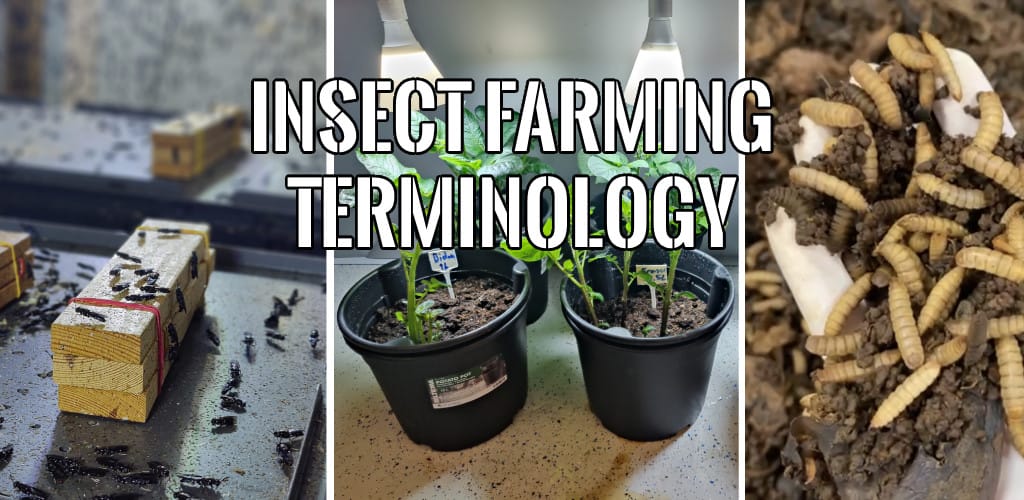
The ABC of Black Soldier Fly farming part 1
In this post series we go through important terminology related to Black Soldier Fly farming (BSF farming), in an alphabetical order. This first post focuses on BSF farming terms from A to C.
5-DOL: Abbreviation for Five-Day-Old-Larvae. Keeping the hatchlings in a controlled and protected environment for five days after hatching increases the survival rate and allows the larvae to be counted before they are added to the biowaste.
Adult: The final development stage of the black soldier fly. With insects in general this is often also called “imago”.
Agro-residue OR agro-waste: This is a term used to describe agricultural residues or waste that can be used as a feed source for black soldier fly larvae.
Amino acids: Amino acids are the building blocks of proteins and therefore determine their quality. The amino acid profile of BSF meal is important to consider for feed formulations for different animals and other use cases.
Aquaculture: The farming of aquatic species, such as in this context various types of fish and shrimps.
Aquafeed: Food for fish and other systematically farmed aquatic species, such as shrimps. Aquafeed can be a very potential income opportunity for an insect farmer.
Attractant: Smelly liquid substance that attracts BSF females to lay eggs nearby. Usually, this contains different smelly substances like fermenting fruit, dead flies or residue. BSF eggs have also been found to act as an attractant. It is, therefore, advisable not to harvest eggs every day as the already laid eggs attract other females. Also notable, that special attractants are not necessary to use in a rearing container kind of set up.
Batch operation: In batch operation, a defined amount of waste and larvae are added to a rearing space, which is harvested after a certain time. Batch operation is in contrast to continuous operation, where waste and larvae are added continuously to the same rearing space. A continuous container is only emptied once it is full.
BCR: Biomass Conversion Rate is the fraction of biowaste which is converted into larval biomass.
Bioconversion: The process of utilizing black soldier flies to convert organic waste into valuable products, such as protein-rich feed or biofertilizers in the form of frass.
Biowaste: All biodegradable matter that is left over from household or industrial use as a waste stream.
Blanching: Blanching describes the process of dipping the larvae shortly in boiling water and subsequently washing them with clean and cold water.
BSF: Abbreviation for Black Soldier Fly, the common name for Hermetia illucens, a species of fly used in insect farming.
BSFL: Abbreviation for Black Soldier Fly Larvae, refers to the larvae stage of the black soldier fly.
CAPEX: Capex refers to company’s expenses and investments associated with physical goods, i.e. the purchase of the goods. Capital expenditures, as a rule, are
• one-time costs (irregular) related to doing business
• expenses referred to the purchase of fixed assets (new equipment, real estate, transport, furniture, buildings, patents, technologies, etc.) and intangible assets
• expenditures for modernization and updating of existing assets
• costs for construction of factories, offices, warehouses, etc.
Castings: The nutrient-rich residue produced by Black Soldier Fly larvae after consuming organic waste, which eventually turns into frass, the leftovers of a rearing period when larvae is separated from the rest of the matter.
CF: Abbreviation often used for chicken feed.
Centralized (vertical) production:
• All processes under one roof
• Aiming to scale to thousands of tons per year from one location
• Investments in millions of dollars
• Typically one company runs everything
• Highly processed end products for e.g. pet food industry
Chitin: A carbohydrate found in many insect exoskeletons, including black soldier flies. Chitin can be used in e.g. biomedical and biotech applications and is considered a very promising income opportunity at large scale productions in the future.
Circular agriculture: Refers to an agricultural circular approach, where various types of agricultural waste is upcycled back to use by means of rearing insects for example.
Climatization: As in climate-controlled and/or climatized container. Climatization of a rearing facility is a way to keep the growth or breeding environment at optimal temperature, humidity and air conditioning levels throughout the growth period. E-g- Manna Insect’s Manna MIND control unit automatically adjust all relevant equipment within a rearing container or facility to optimize the environment for maximal performance.
Composting: Organic matter that has been degraded and transformed by aerobic processes to a soil-like substance and can be used as a fertilizer and soil amendment.
Conditioning: Preparation of the harvested BSFL for selling in live form or further post-processing.
Crude oil: Fat fraction that results from pressing dried larvae with a screw press or similar technical equipment. It is called “crude” because besides the fat also contains solids, which mainly consist of proteins and fibers.
To learn how to become a professional in insect business and Black Soldier Fly farming, sign into the Insect Farm Hub for a library of free video tutorials, webinars and Q&As!
For more information about Manna’s solutions for Black Soldier Fly farming, jump to the Manna Insect frontpage!
Read also the other ABC posts;
The ABC of Black Soldier Fly farming part 2
The ABC of Black Soldier Fly farming part 3
The ABC of Black Soldier Fly farming part 4
Learn more about BSF farming in the
Insect Farm Hub!
Manna Insect has launched a comprehensive insect farming platform designed for learning, managing, monitoring and networking. There are tons of free content about insect farming, as well as a lot of paid premium content, that dives even deeper in black soldier fly business.
